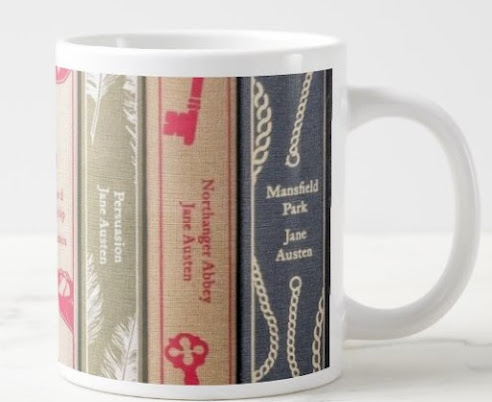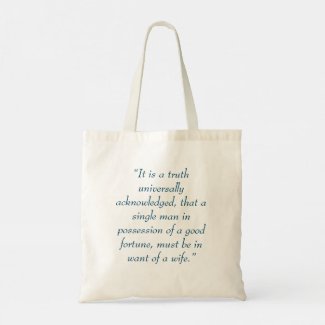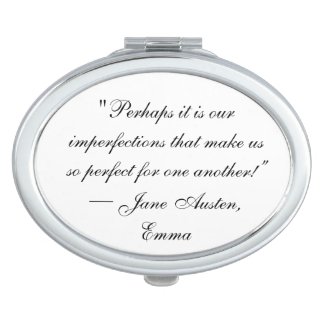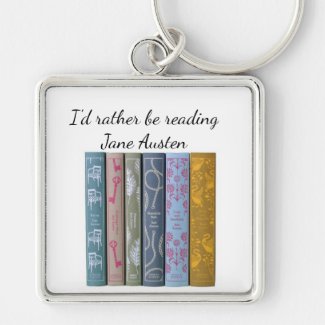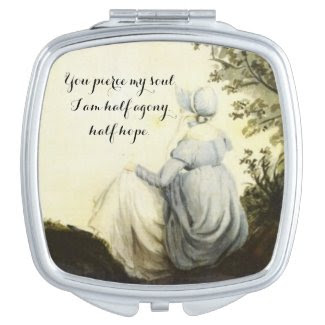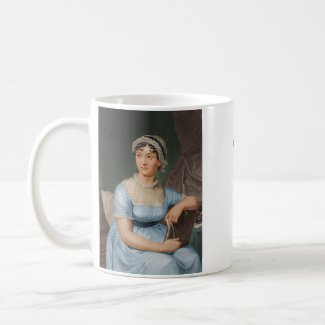"Men of sense do not want silly wives," Mr. Knightley tells Emma.
In context, the infallible Mr. Knightley is correct. Yet Emma is not wrong in her understanding that many men look only for beauty and agreeableness, qualities Harriet Smith certainly possesses.
Jane Austen's novels offer abundant proof of Emma's assumption holding true. One of them appears in
Sense and Sensibility in the narrator's explanation of how Mr. Palmer' ended up with the irritatingly silly Charlotte: "through some unaccountable bias in favour of beauty, he was the husband of a very silly woman" He fell into the same trap that Mr. Bennet fell into and deals it in the same way -- by ignoring his wife as much as possible.
So what drives men of sense to marry silly wives? Or in the case of Mansfield Park, the question may be why do they marry women they are not fit for, as in the disastrous marriage of Mr. Rushworth to Maria Bertram? It's the same thing that drives women of virtue to fall for cads like Wickham, Willoughby.
Chemical reactions
They are taken in by good looks and a flirtatious charm. The response to that arouses sexual attraction, and that chemical reaction is what makes them fall into limerence. The term limerence was not around in Jane Austen's day, though she certainly showed understanding of what it was and how it alone was not a sufficient basis for a solid marriage.
John Gottman refers to limerence in several books and articles. To see it in brief, visit,
Gottman 3 phases of love: " In 1979, Dorothy Tennov coined the term 'limerence' for the first stage of love, characterized by physical symptoms (flushing, trembling, palpitations), excitement, intrusive thinking, obsession, fantasy, sexual excitement, and the fear of rejection."
This, Gottman identifies as the "falling in love" stage of love. That is when one is convinced that they've found "the one" who is peerless and faultless. We see this in Marianne's instant attachment to Willoughby and her priding herself on not being constrained by conventional expectations for relationships because she believes her strong feelings equal complete knowledge of the other (Sense and Sensibility Ch. 12).
"You are mistaken, Elinor," said she warmly, "in supposing I know very little of Willoughby. I have not known him long indeed, but I am much better acquainted with him, than I am with any other creature in the world, except yourself and mama. It is not time or opportunity that is to determine intimacy;-- it is disposition alone. Seven years would be insufficient to make some people acquainted with each other, and seven days are more than enough for others.... of Willoughby my judgment has long been formed."What accounts for this throwing all caution to the wind and believing only the best of the person one is attracted to is literally chemistry. Gottman cites Dr. Theresa Crenshaw’s book
The Alchemy of Love and Lust, about what it takes to "set off the cascade of hormones and neurotransmitters that accompanies the exciting first phase of love."
Incidentally, for all those who think it's all about how a person looks, that's wrong. Appearances alone -- certainly when they are reduced to two dimension on a screen -- can never set off the potent mix of chemical involved in the feeling of attraction. It's not just looks but also how they physically fit, even how they smell.
Gottman lists some of the chemicals that send these limerence signals:
Phenyleteylamine (PEA) is a natural form of amphetamine our bodies produce and has been called “the molecule of love.”
Pheromones, produced from DHEA, influence sensuality rather than sexuality, creating an inexplicable sense of well-being and comfort.
Ocytocin has been called “the cuddle hormone.” It compels us to get close, and when we are feeling close (to anyone) we secrete it. It is secreted by the posterior pituitary gland, and stimulates the secretion of dopamine, estrogen, LHRH, and vasopressin.
We see exactly this experience happening for Marianne in her relationship with Willoughby. While we don't see it happening in the same way,
Sense and Sensibility has Edward Ferrars relate that he had fallen into limerence when he became engaged to Lucy Steele. The feelings that overwhelm the person falling in love are "generally accompanied by poor judgment, so that people will ignore the red flags that they will inevitably confront," as Gottman puts it.
Chemistry alone doesn't cut it
However, Edward wakes up from his infatuation with Lucy after he meets Elinor and starts to realize that there really was nothing there for him besides the superficial attraction. He was attracted-- not unlike Mr. Palmer -- to a woman with some prettiness who knew enough to gain a man's interest. But over four years and seeing another woman who is so much her superior, Edward falls out of limerence and only keeps up the engagement out of a deep sense of honor (watch for another blog on that).
A
Good Housekeeping article on romantic chemistry quotes
Carrie Cole, M.Ed., L.P.C., research director and Gottman Master Trainer at
The Gottman Institute. “Chemistry opens the door, but it’s what we do with it afterwards that determines whether the relationship will have any legs.” She goes on to explain, “chemistry and compatibility are two different things, and sometimes the people we feel an overwhelming attraction to are not right for us long-term."
The bad marriages we see in Austen and in real life are due to those people allowing themselves to marry the person they feel attracted to without thinking beyond that. Cole's quote applies perfectly to the Bennet's, Edward's mistake in Lucy Steele, and the mistake that Edmund Bertram makes about Mary Crawford:
"People can get into trouble by rushing to commit to someone when they prioritize chemistry over shared interests and values.”
Signs of true love as a basis for marriage
Austen is aware of the headiness of limerence and how it is what stirs some people to select someone that may not be approved of by others, though it can be the right choice. That's the story in
Persuasion. Anne picked the right man in Frederick Wentworth but was warned off because lady Russel thought it was just an infatuation. Darcy picked the right woman in Elizabeth, but he had to realize that she was right not just because he is infatuated with her but because she is the choice of reason, as well as feeling.
Darcy wins Elizabeth in the same way that Col. Brandon wins Marianne -- not by arousing limerence but in jumping right to the second phase of love that Gottman identifies as building trust. When one can answer yes to the big questions like “Will you be there for me? Can I trust you?" you get a a strong foundation for a relationship.
Arriving at the yes there is not easy. That's why, Gottman explains, "Love in Phase 2 becomes punctuated by frustration, exasperation, disappointment, sadness." Elizabeth experiences that, as does Anne Elliot, Elinor Dashwood, and Fanny Price.
Building Commitment and Loyalty
Commitment and loyalty are the characteristics of what Gottman identifies as the third phase of love. All of Austen's heroines get that with their choice of husbands. One of the important points that both Austen and Gottman make about keeping that relationship healthy is focusing on the positive rather than the hurt that one had experienced before. The difference between successful and unsuccessful relationships can hinge on whether they opt for "cherishing one another and nurturing gratitude for what they have with their partner, or" choose to dwell on :resentment for what they think is missing."
Elizabeth laughs this off as having a poor memory, while Anne makes a point of having Wentworth see things from her point of view. He does and then admits his own blame in not having come back for her sooner out of a sense of pride (see
Pride, Prejudice and Persuasion: Obstacles to Happiness in Jane Austen's Novels)
And it is very clear that Col. Brandon never blames Marianne for having preferred Willoughby to him, and their marriage is not about settling on her part but about her realizing that the final stages phase of love matter more than feeling swept off one's feet by limerence.
